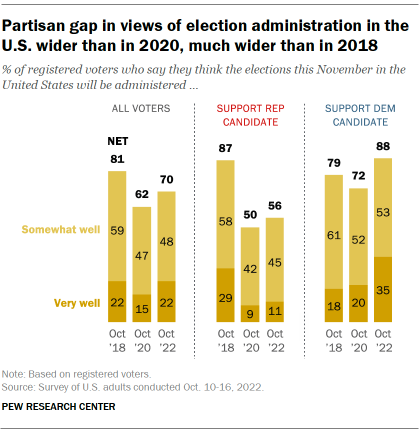An astute reader of my previous blog post, The Problem with Pendulum Politics, inquired why it might be necessary to abandon America’s longstanding electoral system of partisan primaries followed by plurality-winner general elections, when that system served the country well for decades without causing the kind of calcification-plus-parity that characterizes the nation’s politics today. If the electoral system is not responsible for the current problem, and functioned satisfactorily before the current problem materialized, why not seek some other cure to the current problem besides altering the longstanding electoral system?
The question is a fair one, and I cannot address it fully here. But I can point towards a potential answer. There may be developments in America’s overall political system that require modifications to aspects of that system that functioned in an appropriate equilibrium prior to pressures from other sources that knocked the system out of balance. One recent piece of political science along these lines is the essay Madison’s Constitution Under Stress: A Developmental Analysis of Political Polarization by Paul Pierson and Eric Schickler. They argue that changes in various social and cultural forces–including how interest groups interact with parties, how state parties interact with national parties, and the new media environment–make electoral competition within the Madisonian system no longer work as it previously did. Because it’s not possible to undo the external forces that destabilized the system, it’s necessary to adjust the system in order to restore its previous equilibrium.
Schickler also co-authored a separate essay with Nolan McCarty, On the Theory of Parties, which likewise emphasizes the importance of the changing relationship of state and national parties within the overall federalist system. For example, if voters increasingly base their votes for US Senator not on which candidate on the ballot they prefer, but which national party they would prefer to be in the Senate majority, that type of electoral behavior might reinforce the kind of calcification described in The Bitter End, because voters would be less persuadable by the attributes of the specific candidates competing for their Senate seat. Senate elections might differ from gubernatorial elections, for example, in this regard even though both types of elections are statewide races involving the same election. (We’ve arguably seen some evidence of less partisan tribalism in gubernatorial elections than US Senate elections in recent years, and it will be interesting to see if this year’s midterms follow that pattern.)
Ultimately, the merits of an electoral reform proposal must be based on an overall assessment of pros and cons. In conducting that assessment, it’s necessary to acknowledge that just because the cost-benefit analysis would have yielded one outcome under previous conditions does not mean it yields the same outcome under new and significantly changed conditions. Just like climate change may require novel mitigation measures that would have been unthinkable previously because the climate change itself is irreversible, so too may larger social forces that are irreversible require novel electoral reforms that previously would have been considered unwarranted.
